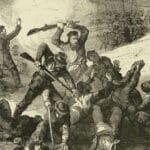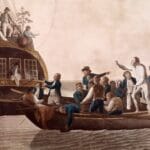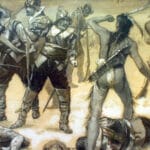Hey there, history buffs and curious minds! Buckle up for a thrilling ride through time as we explore the fascinating events that have unfolded on April 14th throughout the ages. From world-altering turning points to inspiring stories of human resilience, this date offers a captivating glimpse into the tapestry of our past.
April 14th: All Facts and Events That Happened Today in History
April 14th is more than just another day on the calendar; it’s a date marked by pivotal moments that have shaped the course of history, religion, science, and human endeavor. Let’s embark on a journey through time to uncover the remarkable events that transpired on this intriguing date.
From Ancient Battles to the Birth of Nations: A Global Perspective
Our journey begins in 43 BC with the Battle of Forum Gallorum, where Mark Antony secured a strategic victory during the Roman civil war. Fast forward to 193 AD, and we witness the coronation of Septimius Severus, ushering in the Severan dynasty that would rule the Roman Empire for over forty years.
Moving beyond the Roman Empire, we arrive at a momentous event in Polish history—the Christianization of Poland in 966 AD. The baptism of the Polish ruler, Mieszko I, marked a turning point, aligning Poland with the cultural forces of Christianity sweeping across Europe.
Religious Milestones and Cultural Transformations
April 14th holds special significance in various religious traditions. In 966 AD, the baptism of Polish ruler Mieszko I marked the Christianization of Poland, a pivotal event that aligned the nation with the cultural forces of Christianity. Centuries later, in 1699, the Sikh religion witnessed the birth of the Khalsa brotherhood, founded by Guru Gobind Singh. The Khalsa, meaning “the pure,” emphasized equality, service, and spiritual devotion, principles that continue to inspire millions worldwide.
Beyond religious milestones, April 14th witnessed cultural shifts that resonated across societies. The year 1536 saw King Henry VIII of England dissolving the monasteries, stripping the Catholic Church of its immense power and wealth. This act, driven by Henry’s desire for a male heir and a break from Rome’s authority, ignited a seismic shift in English society and religion.
Shaping the World: Inventions, Innovations, and Intellectual Pursuits
On April 14th, 1828, Noah Webster, the lexicographer who gave us the American dictionary, saw his groundbreaking work hit the shelves. Before Webster’s dictionary, American English lacked standardization. His work brought order to the linguistic landscape, defining words in a way that was uniquely American, a landmark achievement that laid the foundation for a shared American language.
A few decades later, in 1863, William Bullock revolutionized the printing world with the invention of the continuous-roll printing press. This technological marvel made it possible to print newspapers and books faster and more efficiently, democratizing access to information and paving the way for mass literacy.
A Nation Divided: The American Civil War and its Aftermath
April 14th is etched in American history as a day of both tragedy and transformation. In 1861, the Battle of Fort Sumter marked the beginning of the American Civil War, a conflict that would tear the nation apart for four long years. Adding to the sorrow, just four years later, on that very same date, President Abraham Lincoln, the man who led the nation through its darkest hour, was assassinated. This shocking event sent shockwaves through a grieving nation still grappling with the aftermath of war.
What is celebrated on the 14th of April?
April 14th isn’t just about commemorating past events; it’s also a day to celebrate the present and embrace the values that unite us.
One of the most significant celebrations is Pan American Day, a day dedicated to honoring the Americas and the spirit of cooperation among the nations of North, Central, and South America. Established in 1890, Pan American Day commemorates the founding of the International Union of American Republics, which later evolved into the Organization of American States (OAS).
In India, April 14th is celebrated as Ambedkar Jayanti, a day to honor the legacy of Dr. B. R. Ambedkar, the architect of the Indian Constitution. Dr. Ambedkar, a champion of social justice and equality, played a pivotal role in shaping India’s democratic foundations and continues to inspire generations with his unwavering commitment to social reform.
For those who appreciate the simple joys of nature, April 14th is also National Gardening Day. This day encourages people to connect with nature, get their hands dirty, and experience the therapeutic benefits of gardening. Whether you have a sprawling backyard or a sunny windowsill, National Gardening Day is a reminder to appreciate the beauty and bounty of the natural world.
And let’s not forget about Children with Alopecia Day, a day dedicated to raising awareness about alopecia areata, a condition that causes hair loss. This day aims to support children living with alopecia, letting them know they’re not alone and fostering a sense of community and understanding.
What Happened on This Day in Black History April 14?
April 14th holds a special significance in Black history, marking pivotal moments in the ongoing struggle for civil rights and equality.
1865: A Nation in Mourning, a Promise Deferred
The assassination of President Abraham Lincoln on April 14th, 1865, cast a shadow over the newly won freedom of Black Americans. Lincoln, who had steered the nation through the tumultuous Civil War and issued the Emancipation Proclamation, represented hope for a more just and equitable future. His death raised uncertainties about the fulfillment of the promise of equality.
1873: Breaking Barriers, Frederick Douglass Takes the Helm
On April 14th, 1873, Frederick Douglass, a prominent abolitionist, author, and orator, achieved a historic milestone when he was appointed United States Marshal for the District of Columbia. This appointment made him the first African American to hold a major federal office, marking a significant step towards greater representation and inclusion in American society.
1955: A Bus, a Boycott, and the Dawn of a Movement
The modern Civil Rights Movement gained momentum on December 1, 1955, when Rosa Parks, a Black woman, refused to give up her seat on a segregated bus in Montgomery, Alabama. Her act of defiance, which some believe was planned in advance, sparked the Montgomery Bus Boycott, a 381-day protest that would capture the nation’s attention and set the stage for the Civil Rights Movement.
1963: Birmingham’s Fight for Freedom
In 1963, Birmingham, Alabama, became a focal point in the fight for civil rights. Led by Martin Luther King Jr., the Birmingham Campaign, which began on April 3rd, 1963, aimed to confront and dismantle the city’s deeply entrenched system of segregation. Despite facing brutal police tactics, the courage and resilience of the protesters, including children, exposed the horrors of segregation to the world.
Looking Back, Moving Forward
April 14th serves as a poignant reminder of the sacrifices made and the progress achieved in the ongoing struggle for racial equality. It’s a day to honor the legacy of those who dared to challenge injustice and to reaffirm our commitment to building a more just and equitable society for all.
What is April facts in history?
April, the fourth month of the Gregorian calendar, is a month of awakening, renewal, and rebirth. Its name, derived from the Latin word “aperire,” meaning “to open,” reflects the blossoming of nature and the arrival of spring. Let’s delve into some fascinating facts about this captivating month:
Origins and Symbolism:
- Roman Roots: In the Roman calendar, April was originally the second month, but it became the fourth when January and February were added.
- Goddess of Spring: The Romans dedicated April to Venus, the goddess of love, beauty, and fertility, reflecting the association of spring with new life and growth.
Notable Birthdays:
- Leonardo da Vinci (April 15, 1452): Italian polymath of the High Renaissance, celebrated for his paintings, inventions, and scientific contributions.
- William Shakespeare (April 23, 1564): English poet, playwright, and actor, widely regarded as the greatest writer in the English language.
- Queen Elizabeth II (April 21, 1926): Longest-reigning British monarch, known for her grace, dignity, and unwavering dedication to duty.
Historical Events:
- Battles of Lexington and Concord (April 19, 1775): Marked the beginning of the American Revolutionary War.
- Sinking of the Titanic (April 15, 1912): One of the deadliest peacetime maritime disasters in history, claiming the lives of over 1,500 people.
Cultural Significance:
- April Fools’ Day (April 1st): A day for lighthearted pranks and harmless deceptions.
- Easter: A Christian holiday commemorating the resurrection of Jesus Christ, often falls in April.
What happened on April 14, 2011?
April 14, 2011, unfolded with a mix of political unrest, natural disasters, and the passing of a remarkable individual.
Political Unrest in Uganda
Kampala, the capital of Uganda, witnessed a day of political turmoil as protests against the rising cost of living turned violent. Kizza Besigye, a prominent opposition leader, was injured during clashes between protesters and security forces. The protests highlighted the economic challenges and political tensions simmering within the country.
Severe Weather in the United States
A powerful line of thunderstorms wreaked havoc across the Southern, Midwestern, and Northeastern United States, unleashing a barrage of tornadoes, hail, and damaging winds. This multi-day severe weather outbreak, from April 14th to 16th, resulted in tragic fatalities, widespread property damage, and served as a stark reminder of the destructive power of nature.
Remembering Walter Breuning
On a more somber note, April 14, 2011, marked the passing of Walter Breuning, the world’s oldest man at the time, at the age of 114. Breuning’s long and fulfilling life served as a testament to advancements in healthcare and the potential of human longevity.
What happened on 14th April 2024?
April 14th, 2024, will likely be etched in history as a day of heightened tensions and military clashes between Iran and Israel. The situation unfolded when Iranian drones targeted Israeli military installations, prompting swift retaliation from Israel. The incident, which some analysts believe was a calculated provocation, sent shockwaves across the international community, raising concerns about a wider regional conflict.
Social media platforms played a crucial role in disseminating information about the unfolding events. However, the rapid spread of news and opinions, often without proper context or verification, highlighted the potential for misinformation to exacerbate tensions during times of crisis.
The incident underscored the importance of diplomacy and de-escalation efforts in maintaining peace and stability in the region. International leaders and organizations urged both sides to exercise restraint and engage in dialogue to prevent further escalation and the potential for a devastating conflict.
What does April 14 represent?
April 14th holds a unique place in history, religion, and numerology, carrying layers of symbolism and significance.
Religious Significance
In the Hebrew calendar, April 14th marks the beginning of Nisan, a month of renewal and liberation. Nisan is the month of Passover, a holiday commemorating the Israelites’ exodus from slavery in Egypt.
For Christians, April 14th is traditionally associated with the crucifixion of Jesus Christ. This date holds deep religious significance, marking a pivotal moment in Christian history and theology.
Numerology and Symbolism
The number 14 carries symbolic meaning in various cultures and traditions. In numerology, 14 is often associated with change, transformation, and new beginnings. Its presence in religious texts often signifies deliverance, liberation, and the overcoming of challenges.
What happened on April 14th 1932?
April 14th, 1932, stands out as a day of remarkable scientific achievement, social unrest, and artistic brilliance, offering a glimpse into a world on the cusp of change.
Atoms Split, Ushering in a New Era of Science
On this day, physicists John Cockcroft and Ernest Walton achieved a groundbreaking feat—splitting the atom. Using a particle accelerator, they bombarded lithium atoms with protons, successfully splitting them into helium nuclei. This experiment, a triumph of ingenuity and scientific exploration, marked a pivotal moment in nuclear physics, paving the way for future advancements in nuclear energy and, unfortunately, nuclear weapons.
Social Unrest Grips Auckland
While scientists celebrated their groundbreaking achievement, the streets of Auckland, New Zealand, were gripped by social unrest. The Great Depression had plunged the country into economic hardship, leading to widespread unemployment and social discontent. On April 14th, frustrations boiled over into the Queen Street Riot, a large-scale demonstration that resulted in clashes between protesters and police, highlighting the devastating social consequences of economic inequality.
A Ballet is Born, Captivating the World
Amidst the scientific breakthroughs and social unrest, the world of art witnessed the premiere of a captivating ballet, “Jeux d’Enfants” (“Children’s Games”), at the Opéra de Monte-Carlo. This enchanting ballet, a collaboration between choreographer Léonide Massine and painter Joan Miró, transported audiences to a world of childhood innocence and imagination, offering a welcome escape from the turbulent realities of the time.
Reflecting on a Day of Contrasts
April 14th, 1932, reminds us that history is a tapestry woven from diverse threads—scientific advancements, social upheavals, and artistic expressions—all shaping the course of human events.
What happened on April 14, 1915?
April 14, 1915, marked a dark day in the annals of warfare as the world witnessed the horrors of chemical warfare on a large scale. Near the town of Ypres, Belgium, during the Second Battle of Ypres, the German army unleashed a devastating chlorine gas attack on Allied forces, forever changing the nature of warfare.
The Horror of Chemical Warfare
Imagine a greenish-yellow cloud drifting towards the Allied trenches, carrying with it a silent and deadly threat. Chlorine gas, heavier than air, seeped into the Allied positions, causing widespread panic and suffering. Soldiers choked and gasped for air as the gas burned their eyes, throats, and lungs. The attack created a gap in the Allied lines, which the Germans hoped to exploit.
Courage and Resilience in the Face of Adversity
Despite the initial shock and chaos, the Allied forces, including the Canadian 1st Division, fought back with incredible bravery. They endured the gas attacks, repulsed the German advance, and prevented a major breakthrough. The Second Battle of Ypres, which raged on until May 25, 1915, proved to be a costly victory for both sides, leaving a lasting legacy of the horrors of chemical warfare.
A Turning Point in Warfare
The use of poison gas at Ypres sent shockwaves across the globe, highlighting the brutal and indiscriminate nature of modern warfare. The battle spurred the development of gas masks and other protective measures to shield soldiers from the devastating effects of chemical weapons. The Second Battle of Ypres serves as a stark reminder of the human cost of war and the enduring need to strive for peace.
What happened on April 14, 2003?
April 14, 2003, was a day marked by significant achievements in science and the ongoing fight against terrorism.
Unlocking the Secrets of Life: The Human Genome Project
One of the most remarkable achievements of the 20th century, the Human Genome Project, reached a momentous milestone on April 14, 2003, when scientists announced the successful completion of mapping 99% of the human genome with an accuracy rate of 99.99%. This groundbreaking accomplishment opened up new frontiers in medicine, providing valuable insights into the genetic basis of disease and paving the way for the development of innovative treatments and therapies.
A Victory in the Fight Against Terrorism: The Capture of Abu Abbas
In a significant development in the global war on terror, U.S. forces apprehended Abu Abbas, the mastermind behind the 1985 hijacking of the Italian cruise ship Achille Lauro. The capture of Abbas, who had evaded authorities for nearly two decades, brought a sense of justice to the victims and their families and served as a reminder of the ongoing efforts to combat terrorism worldwide.
A Day in the Tapestry of Time
April 14, 2003, like every other day, was filled with countless other stories—moments of joy, sorrow, triumph, and everyday life—all contributing to the rich tapestry of human experience.
Exploring Further: April’s Historical Significance
As we conclude our journey through time, it’s evident that April 14th holds a unique place in history, marked by events that have shaped our world and continue to resonate today. From ancient battles to scientific breakthroughs, April 14th offers a captivating glimpse into the complexities of the past and the enduring human spirit.
If you’re eager to delve further into the annals of history, consider exploring the events of April 27th and March 16th, two dates equally rich in historical significance.
- Unlock Filipino Culture: A Deep Dive into Traditions and Practices - April 23, 2025
- Unlock Spanish Culture: Insights & Opportunities Now - April 23, 2025
- White Spirit Uses & Substitutes: A Deep Dive for Pros & DIYers - April 23, 2025

















2 thoughts on “A Journey Through Time: Exploring the Pivotal Events of April 14th in History”
Comments are closed.